|
|
|
Sort Order |
|
|
|
Items / Page
|
|
|
|
|
|
|
| Srl | Item |
| 1 |
ID:
134409
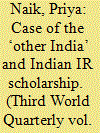

|
|
|
|
|
| Summary/Abstract |
IR scholarship in India has focused on the borders, territory and sovereignty of the Indian state, overlooking the rich complexity of interior border formation between colonial and independent India. The paper argues that the study of the princely states under the British paramountcy (1858–1947), neglected so far, is valuable to ir scholarship on three grounds. First, in mapping colonial India’s engagement with the outside world, the focus has been solely on British India. The princes were equally participative and perceptive of the outside world. Second, the princely states represent yet another challenge to the Westphalian notion of sovereignty, demonstrating the limited capacity of European categories to understand the ‘non-West’. Third, incorporating the paramountcy system in the genealogy of sovereignty of the Indian subcontinent offers a fresh account of border construction inside the state.
|
|
|
|
|
|
|
|
|
|
|
|
|
|
|
|
| 2 |
ID:
134403


|
|
|
|
|
| Summary/Abstract |
The twenty-first century has seen a continued evolution of the US military’s strategic interest in socio-cultural knowledge of (potential) adversaries for counterinsurgency strategies. This paper explores the implications of the reinvigorated and expanding (post-9/11) relationship between social science research and US military strategy, assessing the implications of US Africa Command strategies for preventive counterinsurgency. Preventative counterinsurgency measures are ‘Phase Zero’ or ‘contingency’ operations that seek to prevent possible outcomes, namely threats to ‘security’ in Africa. The research initiatives of US Africa Command illustrate a culture-centric approach to this strategy, which seeks to draw from detailed socio-cultural knowledge in the prevention of possible populist or popular uprisings. Recent such uprisings, resistance actions and strikes in the continent illustrate a problematic tendency to interpret various forms of populist resistance as ‘terrorist’ actions, thereby condoning the bolstering of African national military capacity. The article considers the implications of these culture-centric counterinsurgency strategies as a means of anticipating and repressing the variety of mobilisations encapsulated within the ‘terrorism’ catchall. We conclude by urging social scientists to reject and disconnect from US Africa Command’s missions and knowledge acquisition efforts in Africa.
|
|
|
|
|
|
|
|
|
|
|
|
|
|
|
|
| 3 |
ID:
134401
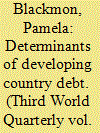

|
|
|
|
|
| Summary/Abstract |
Programmes designed to alleviate developing country debt have been implemented by bilateral, commercial and multilateral creditors and sovereign debt has been restructured under Paris Club negotiations. These strategies have not been very successful at reducing the debt levels of developing countries, in part because they continue to receive export credit insurance facilities through export credit agencies (ecas). The purpose of this paper is to examine the high percentages of developing country debt owed to governmental ecas. Analysis of the external debt of low-income and lower middle-income economies at five year intervals from 1980 to 2010 finds a substantial part of the indebtedness of these economies is held by ecas. Analysis of specific sub-Saharan African countries undergoing debt rescheduling and forgiveness through Paris Club negotiations was done for Ghana and Kenya. These results show that, following debt restructuring, new export credit guarantees and/or loans were forthcoming to these countries from the ecas of the creditor countries that rescheduled their old debt in Paris Club negotiations during 2000–12.
|
|
|
|
|
|
|
|
|
|
|
|
|
|
|
|
| 4 |
ID:
134393
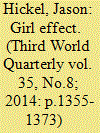

|
|
|
|
|
| Summary/Abstract |
The ‘girl effect’ – the idea that investment in the skills and labour of young women is the key to stimulating economic growth and reducing poverty in the global South – has recently become a key development strategy of the World Bank, the imf, usaid and dfid, in partnership with corporations such as Nike and Goldman Sachs. This paper examines the logic of this discourse and its stance towards kinship in the global South, situating it within the broader rise of ‘gender equality’ and ‘women’s empowerment’ as development objectives over the past two decades. Empowerment discourse, and the ‘capability’ approach on which it is based, has become popular because it taps into ideals of individual freedom that are central to the Western liberal tradition. But this project shifts attention away from more substantive drivers of poverty – structural adjustment, debt, tax evasion, labour exploitation, financial crisis, etc – as it casts blame for underdevelopment on local forms of personhood and kinship. As a result, women and girls are made to bear the responsibility for bootstrapping themselves out of poverty that is caused by external institutions – and often the very ones that purport to save them.
|
|
|
|
|
|
|
|
|
|
|
|
|
|
|
|
| 5 |
ID:
134411
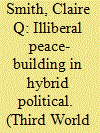

|
|
|
|
|
| Summary/Abstract |
The paper presents a new interpretation of peace-building in contested transitional states. The peace-building literature is dominated by analysis of international liberal processes and policies, their costs and benefits. To understand non-liberal processes of peace-building, especially those conducted by national governments, new concepts have emerged. The paper employs the concept of ‘hybrid political orders’ to analyse the logic of illiberal peace-building processes in transitional states. In contrast to a normative liberal analysis, this approach interprets violent democratising states as they are, rather than as they ought to be. It also assesses the role that illiberal political institutions, such as those of neo-patrimonialism, can play in reducing violence. In the light of overall government policy and two comparative sub-national cases taken from the Indonesian transition, the paper discusses how illiberal peace-building reduced violence during political transition, and when and why it failed. The discussion has relevance for wider understanding of the comparative politics of democratisation and peace-building in contested states.
|
|
|
|
|
|
|
|
|
|
|
|
|
|
|
|
| 6 |
ID:
134406


|
|
|
|
|
| Summary/Abstract |
An important political consequence of the crisis of capital in the 1970s has been an increasing intensification of informal imperialism within Africa. This paper argues that the advanced capitalist countries again confronted the endemic problem of overcapacity alongside a decline in the rate of profit and that the major neoliberal reforms foisted upon the African continent were part of the spatio-temporal fix that followed. The quotidian management of many African states was not an intended consequence of structural adjustment, but the subsequent perturbations that beset many developing countries after following such policies has led to such a degree of institutional instability that a new form of imperial governance has come into being. Juridical sovereignty has been maintained, but political sovereignty has been severely compromised through the emergence of this neo-imperial governance. Today an array of external actors is embedded in the sinews of these states, setting the general parameters of state policy to such an extent that one can no longer speak of these countries as possessing de facto independence. The rise of these so-called ‘governance states’ and the new emphasis on ‘governance with government’ constitute a new non-territorial, political form of imperialism.
|
|
|
|
|
|
|
|
|
|
|
|
|
|
|
|
| 7 |
ID:
134412


|
|
|
|
|
| Summary/Abstract |
This article analyses Mexico’s presidency of the G20 in 2012 as seen through the lens of new multilateralism, with a particular focus on civil society’s growing demand for participation in the shaping of the global agenda. On one hand, we examine the mechanisms for inclusion and participation provided by the Ministry of Foreign Affairs for that specific purpose. On the other, we reflect on the real results of these mechanisms in practice during the Los Cabos Summit. Drawing on our empirical observations, we argue that G20 summits are still very much ‘protocol as usual’, with echoes of traditional multilateralism, thus leaving very little room for civil society to have a noticeable effect on the summit’s conclusions. On a more positive note, the very existence of such mechanisms suggests that the Ministry of Foreign Affairs has at least given symbolic recognition to the importance of having spaces and dialogues available to civil society as part of the presidency’s agenda.
|
|
|
|
|
|
|
|
|
|
|
|
|
|
|
|
| 8 |
ID:
134394
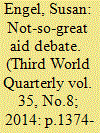

|
|
|
|
|
| Summary/Abstract |
The ‘Great Foreign Aid Debate’ raged in the 2000s yet there are few overviews of it. This paper builds on heuristic classifications of the debate not to simply classify it, but rather to explore how it is perhaps not as ‘great’ as claimed and, in fact, is contributing to a narrowing of thinking about development possibilities. The paper explores the debate through the books released in the 10 years from 2001 that made both an academic and a media impact. It analyses what gets discussed and why and, equally importantly, what does not get discussed. In terms of what is missing, the paper posits that ‘left’ has disappeared and the progressive critique and support for aid has been left to scholars like Jeffrey Sachs and Jonathan Glennie.
|
|
|
|
|
|
|
|
|
|
|
|
|
|
|
|
| 9 |
ID:
134399
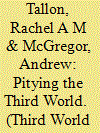

|
|
|
|
|
| Summary/Abstract |
The development sector appeals to emotions in its marketing and education material to raise awareness and funds for its work. Much of this material is now directed at schools, where young people form long-lasting opinions about development and the developing world. This paper draws upon research with 118 students in five New Zealand/Aotearoa secondary schools to show that young people are not passive receptors of development marketing and education. Instead, they question the activities of international ngos involved in aid work and how they are meant to feel or act in response. We examine these emotional responses of young people and the demoralising feelings of guilt, sadness and scepticism that arise, often alongside an innocent paternalism and a desire to help. We outline possibilities for more socially progressive forms of development education, based on the recognition that young people are questioning old ways of doing aid work and looking for something new. We challenge ngos to be part of new forms of global connectedness that disrupt old ‘us and them’ binaries based on difference, and instead to pursue new linkages based on shared feelings of empathy, friendship and social justice.
|
|
|
|
|
|
|
|
|
|
|
|
|
|
|
|
| 10 |
ID:
134392


|
|
|
|
|
| Summary/Abstract |
‘Postcolonial studies’ is the term given to the study of diaspora and the ideology of colonialism. Since the 1970s, when postcolonial studies was termed ‘Third World’ literature, and the 1980s, when it became ‘Commonwealth’ literature, the persistence of the framework of centre and margin, coloniser and colonised, has endured as a lens with which to view human identity and cultural expression. However, the relationship of postcolonial studies to international development is less well explored. Much of postcolonial studies is concerned with articulating patterns of gain, loss, inclusion, exclusion, identity formation and change, cultural evolution and human geographical dispersal in the wake of the after-effects of colonial rule. Postcolonial critics examine texts and images in order to make inferences about the significance of cultural identity and expression under these conditions. Often this is with a diachronic view of history. International development studies offers postcolonial critics a synchronic perspective on both the policy and materiality of political ideologies affecting cultural identity and expression. This paper looks at how the relationship between postcolonial and international development studies might be furthered in a dialectical exchange. Postcolonial critics such as Said and Pollard et al offer a critical understanding that informs policy making in international development contexts.
|
|
|
|
|
|
|
|
|
|
|
|
|
|
|
|
| 11 |
ID:
134402
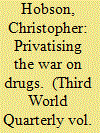

|
|
|
|
|
| Summary/Abstract |
A defining feature of the ‘9/11 wars’ has been the prominent role played by private military and security companies (pmsc). The growth of this market for military and security services has not gone unnoticed. Yet the role pmsc have played in supporting the US-led war on drugs has largely gone under the radar, both literally and figuratively. The aim of this article is to look at the activities of pmsc funded by the USA in Latin America, and to consider the specific consequences that arise from employing them in the field of counter-narcotics. It is argued that the use of pmsc further entrenches a costly and unsuccessful way of dealing with drugs. There is a need to move from a strict prohibitionist stance and consider alternatives to the war on drugs approach, but the use of pmsc creates another strong vested interest in maintaining an increasingly problematic and costly status quo.
|
|
|
|
|
|
|
|
|
|
|
|
|
|
|
|
| 12 |
ID:
134397


|
|
|
|
|
| Summary/Abstract |
What are the causes of state-initiated human rights violations? Are intra-national factors alone causally responsible for the emergence of human rights crises in the developing world? This article critically examines contemporary social science literature on the causes of human rights compliance and violations, particularly in the fields of international relations and comparative politics. It underscores the finding that the current research agenda on human rights has yet to fully recognise the causal and constitutive links between transnational and domestic factors in generating variations in states’ level of compliance. The main goal of the paper is to analytically explore the possibilities of generating social scientific research that recognises the interactive causal dynamics among extra-national and domestic variables as they jointly produce cross-national variations in the quality of a state’s compliance with human rights norms. Based on a critical analysis of the current scholarship in human rights research, the paper offers several pathways the academy must traverse in order to enhance our understanding of the causal underpinnings of human rights violations in the global South.
|
|
|
|
|
|
|
|
|
|
|
|
|
|
|
|
|
|
|
|
|